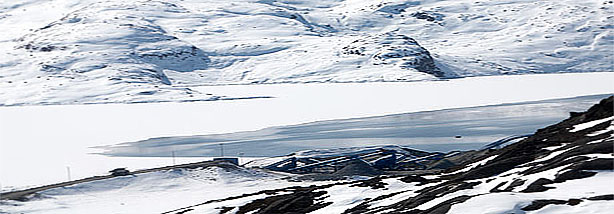 Seqi Olivine mine in Godthab, Greenland. Global warming is opening up the Arctic for exploration. Photograph: Kent Klich Seqi Olivine mine in Godthab, Greenland. Global warming is opening up the Arctic for exploration. Photograph: Kent Klichguardian.co.ukMonday 4 July 2011 16.39 Q&A: natural resources exploration in the Arctic What is the Arctic? The Arctic is the area around the north pole – as opposed to Antarctica, which surrounds the south pole. The Arctic can be defined in a number of different ways but is generally considered to be the region inside or near to the Arctic Circle.But some will define it on the basis of air or sea temperature, the native territories of the Arctic indigenous peoples, or the area north of where trees stop growing. Why is it regarded as special? Very little industrial development has taken place in the Arctic region and there are fears about the impact on the environment if – as expected – human use accelerates fast. The environment is largely unspoiled but global warming is having a rapid impact. There are fears that diminishing sea ice is shrinking – one of the Earth's ways of deflecting heat from the sun. This damages the habitat of microscopic plants and animals living on the underside of the ice. What part do indigenous people such as Inuit play? Human rights advocates demand that the Inuit and other indigenous people from the area are consulted in any development process. But there are practical skills in survival that must be retained for the good of everyone. Signatories to the United Nations Convention on Biological Diversity are under an obligation to respect traditional ways of life.Many local groups such as the Sami in Finland and Siberia often feel that their views are not given the same weight as others'. Indigenous groups have often argued that their traditional way of life around hunting and fishing will be damaged most by new oil projects. There is concern about spills and wider environmental damage. However, indigenous communities have also benefited from investment by oil and mining companies. What has triggered new interest in the Arctic now? Global warming is opening up the Arctic Ocean to transit by ships, which can cut east-west voyage times by one-third. Warmer weather allows oil and mining companies to tap into previously inaccessible new reserves with which to feed growing demand from the fast-growing economies of China and India. What rules govern the far north now? The 1982 United Nations Convention on the Law of the Sea is at the centre of contractual arrangements. The convention regulates the use of the sea and provides a framework for settling territorial issues.What it does not do is give a clear formula for how shared maritime space such as the Arctic Ocean is to be divided. But issues can also be discussed inside another UN body: the London-based International Maritime Bureau. Should there be an Arctic treaty? The south pole is the subject of an Antarctic treaty but there is no similar arrangement for the far north. Organisations such as the European Union and the wildlife group WWF have argued one is needed. But most coastal states around the Arctic are not keen to have their hands tied by an international agreement of this kind. They argue the Convention on the Law of the Sea provides much of the right framework while other issues can be discussed inside the Arctic Council. What is the Arctic Council? The Arctic Council is a forum set up in 1996 made up of eight member states, of which five have "continental shelf" land, which stretches into the Arctic Ocean. The five coastal states are Norway, Canada, Denmark (through Greenland), the United States and Russia. The three other council members are Sweden, Finland and Iceland. Why do other countries want to join? China and the European Union and have applied for observer status to the Arctic Council. They argue that developments in the Arctic have important consequences for future generations worldwide. Equally, EU industrial activities and policies can significantly affect the Arctic, they argue. Key issues are climate change, oil drilling, fishing and shipping in the far north area. |